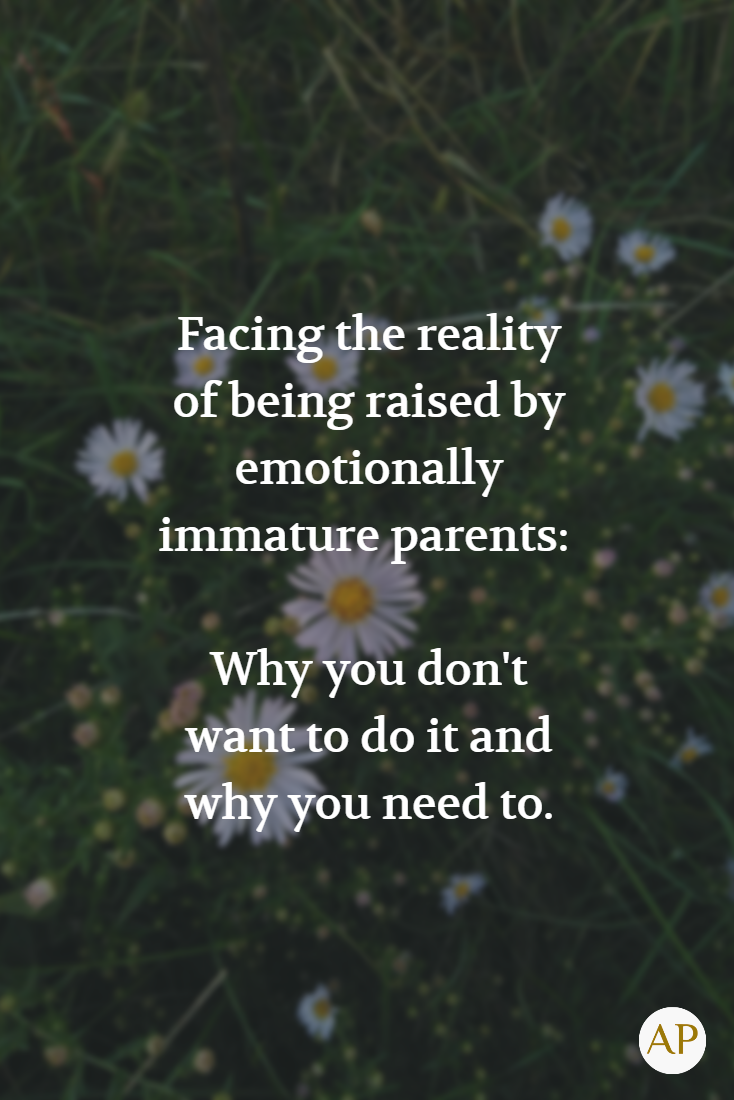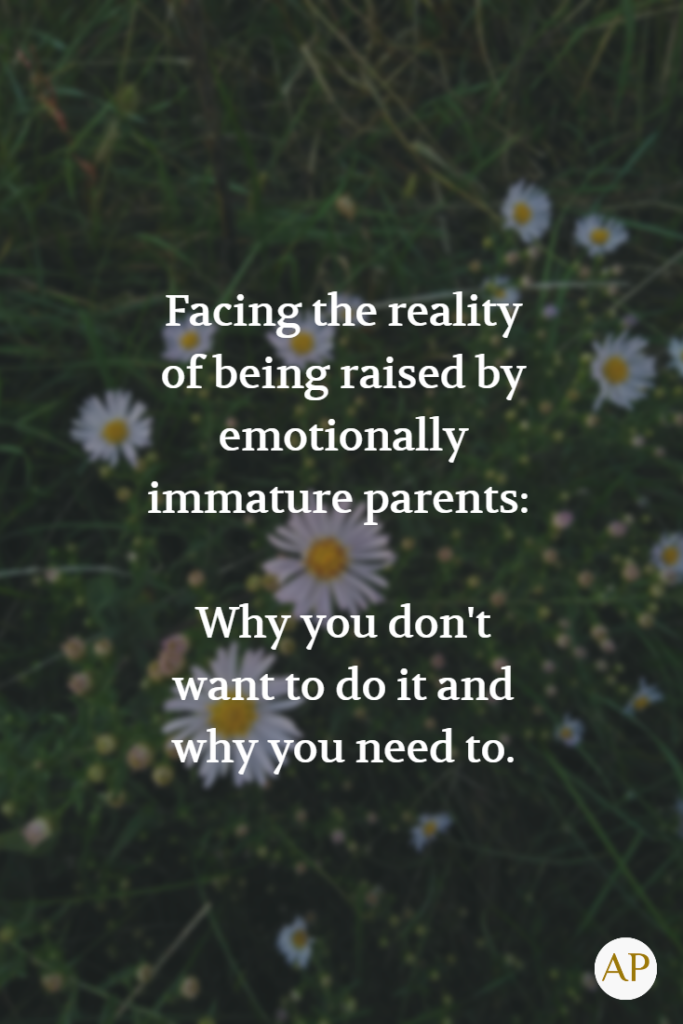Something about the way you were raised left you unable to function properly as an adult.
You might be an adult child of an alcoholic, parents that had other types of addictions or were chronically ill and therefore unable to give you care and attention you needed.
You often felt like you were the most adult person in the room, despite being a child. But now that you are adult, it often happens that you feel like a child. If you were used to feeling like you are ahead of your peer groups, because you were often the most responsible one, you might feel lately like they transitioned into adulthood and you are still stuck in your childhood. Or in angry teenager phase.
You want to help yourself, but there are some things that are holding you back from going all in into facing your heritage as child of emotionally immature parents.
Let’s look at those things.
Why at times you just don’t want to face your heritage as an adult child?
⇉ You connect the term adult child of alcoholic / addict / narcissist / chronically ill with very sad images, and you feel like you just don’t fit the picture.
I thought for a long time that I turned out great. My father was an alcoholic and there was a lot of fighting or loud silence in our house, but hey, I was doing great at school, I had a boyfriend that loved me and I felt like my use of weed and alcohol was moderate. Drunk driving was always a big no for me, if I was drinking, I came home with a taxi. I was responsible.
In my mind, children who were affected by their parent’s addiction looked like this: They had bruises, a sad or angry look in their eyes, looked pale, too thin or too fat. They had bad grades at school and were obviously afraid of authority.
Later on, they might become drug addicts or alcoholics themselves, doing all kinds of irresponsible things and rebelling against authority, even without reason.
I was intelligent, fun and cool. I always had friends I could have deep shit conversations with. I was grateful for many things in my life. My biggest addiction were always books. And cigarettes, but I always knew I will quit someday.
I turned out great, I was not one of those sad/angry people.
(Except I was.)
Question for you: Are you avoiding facing your family baggage, because you look differently than what you imagine when you hear “adult children of alcoholics”?
⇉ You feel like you are too sensitive. Other people had it way worse than you did, after all.
You don’t want to complain about your parents and family members. You heard of examples or you know people that had it way worse than you did. When you hear their stories, you want to hug your parents and thank them. You feel like if you started facing your heritage as an adult child, it would mean you are ungrateful for all that your parents did for you. You don’t want to be ungrateful. You don’t want to feel ashamed of your family.
I once spoke with my friend about this, and she said we should be grateful to our parents, because they always did the best they could. If we feel gratitude towards our parents, our life is better too.
While I agree with her in some way and know where she is coming from, I gave her the following metaphor:
Imagine that your parents do the best they can to cook for you, but they usually burn the food. The burned food is still toxic and doesn’t taste good, despite your parents doing their best.
If you grew up with emotionally immature parents, you ate a lot of burned food.
If you can’t feel grateful to your parents for doing their best, don’t worry. Maybe you will someday.
But for now, admit to yourself where you are fucking angry at them for not doing better and screwing things up for you.
Question for you: Where you wish your parents could do better than they did? What you wish was different?
⇉ Feeling like you are too old to still blame your parents for what is wrong with you.
I agree that there comes a time to stop blaming parents and do the best that you can.
That’s why I want to encourage you to do this work. Because once you know where you are still “preparing burned food” for yourself because that’s why you learned from your parents, you can stop and ask:
Is there a better way? What can I do differently?
⇉ You are afraid that once you open that closet, skeletons will keep falling out.
Probably they will. Let them.
⇉ You are afraid of all the big emotions that will come to surface and the time it might take to heal them.
You fear if you allow yourself to feel your anger, you will start destroying things.
You fear that if you let yourself cry, you won’t be able to stop and that you will feel like a victim forever.
You are afraid of the fear itself, sometimes anxiety can quickly turn into panic, even terror.
⇉ You are connecting recovery programs and healing with spirituality and/or God.
Another thing that was perhaps traumatic for you, if you grew up with a religious background.
For some spirituality and God may have no negative connotations at all, some people find comfort in connecting to something bigger.
But if you were for example asking god to heal your parents from addiction, yet nothing happened, you might have God trauma.
You can also be an atheist and don’t want to relate to any group or program that mentions god or higher power.
If you are an atheist or someone who is allergic to word god, due to religious trauma, check out 12 steps written from a secular perspective.
⇉ You don’t want to join group meetings for adult children.
You don’t have to. I haven’t so far. Maybe I will in the future, but so far reading books, doing my inner work, writing about it and talking about it with a therapist and a coach has already helped me tremendously.
Why you want to be courageous and face your heritage as an adult child anyway?
Because we are often stuck in the same patterns of behaving and emoting as we observed growing up.
⇾ You might not be an addict yourself, and consider yourself a loving human, yet you unconsciously do to yourself and others what was done to you.
⇾ It is also very common for adult children that we are attracted to people with which we can recreate the dynamics that we grew up in. Sometimes those relationships can look very different on surface, yet have similar bitter taste on an emotional level.
⇾ This also shows up in your work/business related relationships. As Janet G. Woititz says: “when folks do not address the characteristics of ACoAs, the workplace becomes a replica of the home and the adult child can once again feel victimized.“
You have developed a set of survival strategies that were essential when you were growing up, but no longer serve your highest good.
Example: Making yourself invisible when necessary was a very useful skill (that you can still tap in case of real danger), but not allowing yourself to be more visible might be limiting your business expansion.
Because this work is super beneficial:
You will start growing as a person.
You will transform your relationship with yourself.
You will improve your relationships with other people and/or find new people who get you, with whom you can have the most fulfilling relationships.
Your sense of self will start coming back. You will remember the confident part of yourself.
You will start to feel more worthy of having good things in life.
As you work through your traumas, your sleep will improve.
Your nervous system will calm down.
Huge amounts of guilt and shame will just fall away.
You will start enjoying way more of what life has to offer. Find healthy and creative hobbies.
Your need to self-medicate will start going away.
You will get back motivation, courage and confidence to work on the things that matters to you.
Life will start to seem more meaningful.
You will enjoy company of other people again.
You will start seeing that so many things you blamed yourself for simply weren’t your fault.
You will start seeing, where you are lacking some pieces that you need to be a functional adult and you will realise that no matter what you’ve been through, you are perfectly equipped to start getting those pieces.
What happens if you do not confront your heritage as an adult child?
I don’t want to sound like you are doomed, but heck, you kind of are.
Even when you start facing it, it takes time to heal and you still repeat some of the old patterns.
But if you are avoiding doing the work it takes to heal, you will:
Repeat the patterns of behaviour you were raised in.
Keep replaying the drama. And attracting people with whom you can repeat the dynamics.
Manifest physical symptoms due to unprocessed emotions.
Need to self-medicate and probably become an addict yourself.
Live with a lot of guilt and shame.
Let other people walk over you.
Burn out in trying to be the best that you can be for everyone that needs you.
…
What happens when you do start facing your heritage as an adult child?
You start to feel relief, as you finally have an explanation for many things that you thought were wrong with you. You feel hopeful.
Then you start to feel a lot of anger, feelings of unfairness.
It is unfair, that you had to be a little adult, when you were child, do extra work and emotional labour to ensure your survival. And now as an adult you have to do extra work to reparent yourself, to give yourself what your parents couldn’t give you, to heal your traumas, just so that you can become a functional adult. It might seem unfair, what advantage children from loving homes have. You have to do extra work to get what would be given to you if you had emotionally healthy parents.
There is also so much compassion for your little self coming up. For the child that has to go through all of this. And there is huge amount of sadness, of grief. Tears just won’t stop. Like all the tears you stuffed down as a child, they are coming out now.
At times it feels like anger and grief won’t ever be over.
There comes another one of big feelings. Fear. All those moments you were frozen from fear. Now it is coming to surface.
I am just realising now, as I write this. For me it was so, that I lived with a lot of guilt and shame for most of my life. And when I started reading about ACOA, a lot of my shame and guilt started to dissolve, as I started seeing that I am not that bad person I thought I was, I started to understand why I was like I was. And underneath the shame and guilt were anger, sadness and fear.
Those were emotions I couldn’t express in my family. I didn’t really feel heard, seen and loved if I expressed them. If I showed my anger, there were guilt trips. If I showed tears, I heard it’s going to be over until I get married. And if I was afraid of something, I was told I must be courageous. Soon enough I tried to deal with these feelings on my own. And also hide them from my family, and later in life from other people as well. Trying to be responsible, successful, kind to everyone and then blaming and shaming myself when I didn’t meet my expectations.
This may sound depressing, I know. Why would you want to do this work?!
But as you stick to the process, not abandoning yourself, staying with yourself and your emotions, even when they seem unbearable, you start to feel more at home within yourself. Your power is returning back to you. Confidence comes back. You believe in yourself more and more.
And oh my, you start having so much fun in life.
You start feeling worthy of those dreams you have.
You also become more realistic.
You know some things take time. Usually we can’t just change our life, our personalities completely overnight and achieve our biggest dreams in less than a week.
So, you start enjoying the journey. Life becomes more rich in depth. How can I express this? It’s not like you do everything totally differently than you did before starting your recovery journey, but some of the things that you do, feel differently. You cherish some everyday life experiences way more than you ever did before.
I remember reading in book about complex PTSD from Pete Walker, that it takes a lot of time to heal. Maybe till the end of your life. But it is worth it.
When I read this, I said to myself, that I am giving myself 5 years to become more confident. Let’s see what happens in 5 years, if I commit to the process.
It’s one year and a half since then. I am perhaps about 30 or 40% more confident than I was and my life feels exponentially better.
It really is so fucking worth it to commit to yourself and to your healing. I know that your life will start to feel exponentially better too!
Questions for you: What is your main reason for avoiding facing your heritage as an adult child? And what is the main reason you want to commit to it? Please, share in the comments.
*
Ah, thank you guys for reading! I write in my style, I share my stories, my personal examples. Your experiences and your journey may differ, but I am also sure you can find a lot of common points that will serve you on your journey. It is my intention with this series to give you something valuable, to inspire you to commit to yourself, and it is also my intention to go deeper with my own healing as I share my journey.
In the next post I will share with you the books that helped me the most on my journey so far.
Here you can find all the post in this series so far:
What I wish I knew sooner as an adult child?
List of all the posts in the series:
- Intro: What I wish I knew sooner as an adult child?
- You are not the one to blame for your parent’s addiction, depression, illness, death…
- How are guilt and shame holding you back from advancing in your career?
- Facing the reality of being raised by emotionally immature parents: Why you don’t want to do it and why you need to.
- Top 3 Must Read Books, if you are ACOA (adult child of an alcoholic or you are coming from an otherwise dysfunctional family)
P.S.: I would love to support you as a coach in your journey. Even if you are an adult child, we can still work on your big business idea, while making sure you take good care of your inner child. Read more about working with me and email me at anita@anitapuksic.com if you have any questions.


